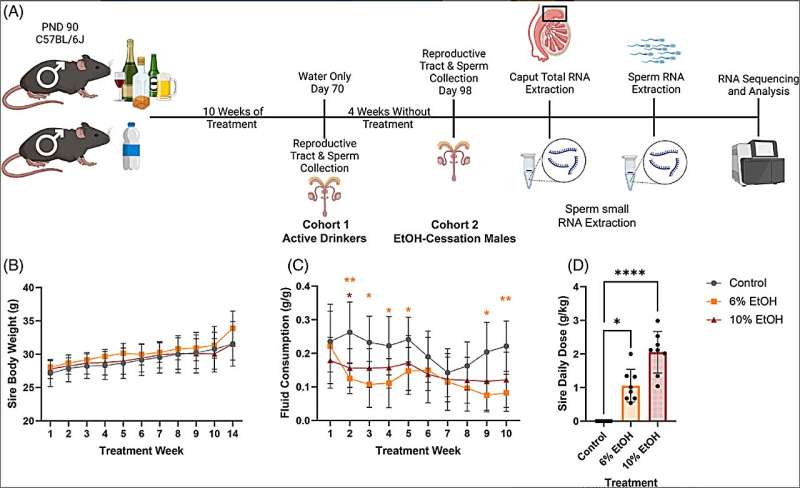This article has been reviewed according to Science X's editorial process and policies. Editors have highlighted the following attributes while ensuring the content's credibility:
fact-checked
trusted source
proofread
Researcher says men should abstain from drinking at least three months prior to conceiving

Researchers at Texas A&M University have already shown that paternal drinking habits prior to conception can have a negative effect on fetal development—with semen from men who regularly consume alcohol impacting placenta development, fetal alcohol syndrome (FAS)-associated brain and facial defects, and even IVF outcomes.
In an article published this month in Andrology, the lab of Dr. Michael Golding has now demonstrated that it takes much longer than previously believed, longer than a month, for the effects of alcohol consumption to leave the father's sperm.
"When someone is consuming alcohol on a regular basis and then stops, their body goes through withdrawal, where it has to learn how to operate without the chemical present," said Golding, a professor in the School of Veterinary Medicine & Biomedical Sciences' Department of Veterinary Physiology & Pharmacology. "What we discovered is that a father's sperm are still negatively impacted by drinking even during the withdrawal process, meaning it takes much longer than we previously thought for the sperm to return to normal."
The dangers of paternal drinking
One of the major risks associated with alcohol consumption before and during pregnancy is FAS, which causes abnormal facial features, low birth weight and/or height, attention and hyperactivity issues, and poor coordination.
Currently, doctors are required to confirm only that the mother has consumed alcohol—not the father—to diagnose a child with FAS.
"For years, there's really been no consideration of male alcohol use whatsoever," Golding said. "Within the last five to eight years, we've started to notice that there are certain conditions where there's a very strong paternal influence when it comes to alcohol exposure and fetal development."
"With this project, we wanted to see how long it would take for the effects of alcohol on sperm to wear off," he said. "We thought it would be a relatively quick change back to normal, but it wasn't. The withdrawal process took over a month."
When drinking alcohol, an individual's liver experiences oxidative stress, leading the body to overproduce certain chemicals, which then interrupts normal cellular activity. Golding's team discovered that withdrawal causes the same kind of oxidative stress, effectively lengthening the duration of alcohol's effects on the body beyond what was previously thought.
"During withdrawal, the liver experiences perpetual oxidative stress and sends a signal throughout the male body," Golding said. "The reproductive system interprets that signal and says, 'Oh, we are living in an environment that has a really strong oxidative stressor in it. I need to program the offspring to be able to adapt to that kind of environment.'" But Golding suspects that the adaptations to the sperm aren't beneficial—they lead to problems like FAS.
He also noted that it doesn't take excessive alcohol use for a person to experience withdrawal.
"In the models we're using, even drinking three to four beers after work several days a week can induce withdrawal when the behavior ceases," Golding said. "You may not feel inebriated, but your body is going through chemical changes."
Changing the narrative
Golding's work is vital to improving pregnancy outcomes by changing the conversation about who is responsible for alcohol-related birth defects, since society has historically placed all blame on mothers, even when they do not consume alcohol during their pregnancy.
"There's psychological trauma associated with the question, 'Did you drink while you were pregnant?' It's also difficult for physicians to have that conversation," he said. "But if they don't, then FAS doesn't get diagnosed right away and the child may not get the support that they need until later in life."
Because of this, it's crucial that couples planning on getting pregnant know how far in advance to stop drinking in order to prevent birth defects.
While Golding and his lab will continue to research the effects of paternal drinking to help doctors advise couples, he suggests that fathers abstain from alcohol at least three months prior to conceiving, given this groundbreaking discovery.
"There's still a lot of work to be done to get a hard answer, but we know that sperm are made over the course of 60 days, and the withdrawal process takes at least one month," he said. "So, my estimate would be to wait at least three months."
More information: Alexis N. Roach et al, Alterations in sperm RNAs persist after alcohol cessation and correlate with epididymal mitochondrial dysfunction, Andrology (2023). DOI: 10.1111/andr.13566




















